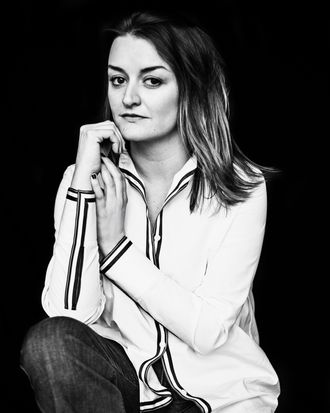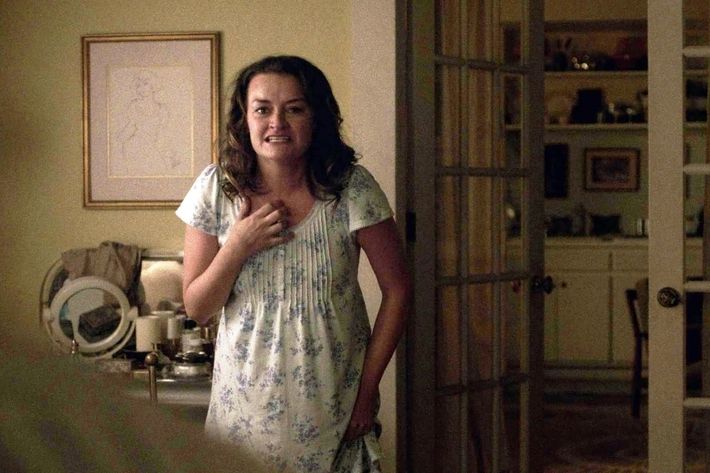
On FX’s The Americans, our heroes are constantly changing, but ever so glacially. It’s Martha Hanson — the FBI secretary Philip (Matthew Rhys) married to gain access to classified secrets — who perhaps best captures the show’s emotional urgency. Played to devastating effect by Alison Wright, Martha’s season-three arc ended with a gut-punch: Philip-as-Clark stripped off his glasses and wig in a huge, shiver-inducing show of trust. But for Martha, truth is stranger than fiction as she begins season four adjusting to marriage with a man she doesn’t recognize. Wright stopped by the New York offices to discuss studying serial killers’ wives, the amount of tears she had to produce this season, and why Martha’s in more danger than ever.
Now that Martha knows who Clark is, or more, who he isn’t, does this make you trust him more or less?
Martha pushed his hand and wanted the next level of intimacy from him. She wanted him to reveal himself in an emotional and psychological way, but he also did it literally. Being faced with the truth absolutely has been terrifying for her, and we find her in that place when we start the fourth season. She’s only had not even a couple weeks to deal with this new face on her husband, this new man who looks drastically different to the guy that she married. She’s in that adjustment period when we start, and right out of the gate he tells her, “I’ve murdered your coworker.” I don’t think she thought he was a murderer. Something breaks in her in that moment that is not repaired throughout the rest of the season.
It’s not that she’s afraid of him, it’s not that she doesn’t trust him more. She gets that he revealed something for her because she wanted him to. But what he has revealed is really shitty.
In terms of her idea of having a marriage with him, has that been shattered?
No, I don’t think so. She really values the honesty he’s given her by doing that, and him revealing himself explained a lot of things. It explained the absence and the reticence and what she thought might have been lies. She can see it’s a huge thing he’s done by showing her himself, and she thinks it’s just going to be a long period of adjustment. She’s in a state of mind that this has bound her closer to him, for worse or for better.
Will Martha enter Philip’s world more this season?
She’s with a weird combination of Clark and Philip now. She’s aware that Clark’s not just Clark anymore. He’s a man with a new face and dark hair and no glasses. Philip drops his Clark act from now on, so it’s another level of the discomfort and confusion that she’s with both of them. I used to think about the moments where I imagined her watching him, seeing his new face and thinking, Who is this new man who doesn’t look anything like my husband? Maybe she liked the old guy better. This is a strange man she’s with now, and I imagine that could be quite terrifying.
As an actress, knowing that Philip exists and knowing who he is, does that affect how you see him as Martha?
It does, because Alison is seeing the whole story. I told the Js [showrunners Joe Weisberg and Joel Fields] recently that it had occurred to me at the beginning of this season to ask them to only give me my story line, so I didn’t get to know what else was going on with him. But unless you create those boundaries of keeping that information kept away from you, it’s really impossible not to hear stuff on set. It would be super hard, and now maybe it’s too late in the game for me to try that. It would’ve been interesting from season one to do it and see what would be different. Once you know something you can’t unknow it. Honestly, it’s hard to say.
At least from the viewer’s perspective, it doesn’t feel like you know more than you do.
That’s great. And I think that’s as well because there’s a level of her not admitting stuff to herself, too.
When you are going through your process with Joe and Joel, do you sit down at the beginning of the season and go through your story line?
No, they don’t talk to you at all unless they can help it. [Laughs.] I’ll go to them with questions all the time.
They mentioned that your script is usually scribbled all over with notes, to a Beautiful Mind-level of specificity.
Yes, when it starts to get really complicated, like this season.
What kinds of notes do you make for yourself?
Anything. You’re taking onboard as much as you can and you don’t know what’s going to serve you in the end or what you’re going to use. You never know how something’s going to inform a line or your opinion of something. For her it’s complicated as well, because there are all these different things she knows on different levels and is not admitting to herself or the audience necessarily. My notes are just trying to track all the thoughts and ideas she could be having and trying to figure this stuff out — what could the options be? What does she expect, and what is actually happening?
There was a piece in The New Yorker, “The Spy Who Loved Me,” in 2014, with a story somewhat similar to Martha’s. How much do you read stories that mirror Martha’s experience?
All the time. Everything I can possibly get on the literal cases that there are and then anything that would compare to her level of stress, about finding out she’s living with a stranger. Further into the season when the story develops more, I started to try and find some substitutions for someone in a similar situation, about what that must be like. And I thought about the wives of serial killers because that’s comparable to me.
Are there any examples that jump out?
Yeah, Judith Ridgway. She was the wife of the Green River Killer, who’s in prison. His name is Gary Ridgway. She was a woman that seemed to be quite like Martha. The day, the moment she found out for real that her husband had killed 40-some people, in their 17 years of marriage, there’s a tiny bit of footage of her looking out of her little kitchen window. She looks like how I imagine Martha — she’s this really small woman with her glasses on, and she’s not even there. There’s an interview of her talking about that moment where she just felt like a wall came down in front of her, and her life was never the same. She said this great thing about her husband, which I took onboard for Martha in the later episodes [this season]: “I love my husband but I hate the man that took him away.” I think that’s a little bit of Philip and Clark, when she gets further down the road and starts to stand on her own two feet a little more and makes some hard decisions.
I was trying to find something that compares to being that huge, to that life-devastation bombshell. That’s not just grief, that’s not just death.
Right, that’s such a specific experience. You mentioned looking at Judith’s face during that footage. One of the things I love about your performance are your reactions — a lot of the role is in your face and your expressiveness. How much of that is you feeling it in the moment versus notes that are written in the script that “Martha should feel this or that way”?
Both. Some people actively ignore that stuff, all of those adjectives. It’s never really a clear line to me when I’m supposed to do that or not. Because if you make your own decisions, then you get to set and they’re like, “Well, it says here, you were supposed to be crying.” It’s a tricky thing, but it has to be in the moment, in the reality of the circumstances. There are a lot of directions for her crying in the script this season, I’ll put it like that.
When you cry on the show, it draws out so much empathy for the character, and in the season-four premiere we see that again. How do you prepare for that? Does it come easy for you?
It has to be there in the writing, or at least it’s better if it is. I’m usually good — depending on how long the scene is, if it’s super emotional and I’m supposed to be crying the whole time — for four takes. Then it becomes a bit more laborious. That scene [where I’m crying] in the season-four premiere, we were doing that for about five or six hours.

Oh, my God. So you have to just …
Produce tears.
Early on, some people referred to Martha as the comic relief in the story. Did you think of her that way?
I thought of her as being a very open person that doesn’t really have any armor. That allows for lots of moments of levity. I can see how she could be quite comical because she was never trying to edit herself. So I wasn’t surprised to hear that. Maybe quirky is a closer description. She’s a little more like the rest of us, she’s a little more like the audience.
She does feel like a gauge for how the audience is feeling.
She’s a normal person who doesn’t have any of these skills or abilities or protection devices. She’s a way for the audience to connect into the story.
Do you imagine any kind of backstory for her? Did she have any friends at some point?
Essential backstory, yes. All of those things fill up the moments where you maybe don’t have any lines, because you’re a person who has a life. So you can be having that life in the background of a scene or if someone else is having a moment. Her relationship with her parents as well, and we get a bit more of that this season.
As her role has deepened, Martha has become a fan favorite. Have you noticed a difference in how fans have reacted to you as the seasons have gone on?
Now women come up to me often and talk about how bad they feel for her, and how lots of their girlfriends from their 20s into their 60s can empathize with her and take her plight seriously. It’s not a joke anymore. I feel the gravitas from people when they talk to me more.
There are some parallels between Paige and Martha — they’ve both had their worlds upended, and neither of them is very good at lying.
We observed it at the end of last season. There were moments where they felt like the two noble characters still left in the story, or just the most benign. That doesn’t really continue into this season, though.
It does feel like things can’t really end well for Martha. Major characters haven’t died off very often on The Americans, and it’s clear that Philip is looking out for you. But it’s always a question for your character.
She’s in the most dangerous spot she’s ever been in in her life, and it’s not going to get any better as we progress. Stan is already sniffing around. She’s in a really bad way. So, yeah, you should worry about her.
In one of your scenes with Stan this season, you deliver one of the best lines: “I guess you never really know a person, do you?” How self-aware is Martha in this moment?
The Js have purposely wanted to walk either side of that line. It’s pretty subjective, the words people use to describe her. Especially because she’s not spelling out what she does know and what she doesn’t know or what she thinks. That’s something that I had to go back to the Js about a lot. I’ve always assumed that she was more self-aware than they want her to be. And I often had to step back and not have her thoughts link together so fast, because she doesn’t put stuff together as fast as I do. So that was tricky, that was something I had to keep checking in with them about, “How come I don’t understand … ?” And they’re like, “Well, because …” But she has a mirror held up to her this season, and there’s no more not admitting things.
How do you change your body language to play Martha?
Where we’re at now in the story, she doesn’t have a lot of time that’s not really stressful, and it’s really taken a toll on her body and her mind. All of this season, she’s very tense and tight and ready to run. She’s not as relaxed and open as she was before.
Outside of The Americans, are there any roles that are on your bucket list?
For me, it’s more directors I’d like to work with. I’d like to be in a Mike Leigh film. And I’d love to work with Pedro Almodóvar.
As your first big TV role, how has playing Martha changed your life?
It’s been completely career-changing for me. It’s wonderful, every room I walk into for auditions or meetings, 99 percent of people are big fans of the show. Everybody in the business watches it and respects it. So regardless of our numbers and all those things that they measure, it’s a really admired show, and it’s great to be on a winning team. It’s like supporting the Yankees.
On Alison: Hermès white shirt in cotton with blue ribbon trim, $1,300 at Hermès stores nationwide.


